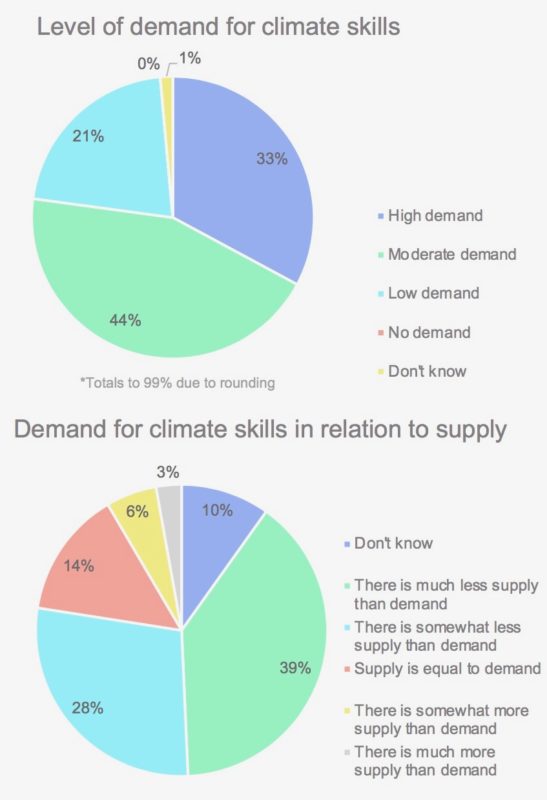The rapidly growing influx of money into climate-conscious development, known generally as green finance, has become big business in recent years. Moreover, financial regulators such as central banks are starting to scrutinise financial practices in order to achieve greater accountability in green finance. However, the ISF’s key conclusion from its survey was that there is currently a climate skills gap in the Australian financial sector, a gap that “is likely to grow unless urgent action is taken.”
According to one respondent: “The specialisation of skills/knowledge required for this area has moved very quickly and there are not enough people who have experience of both climate and the finance sector.”
To that end, the report’s authors say Australia “requires a sustainable finance learning ecosystem to support sustainable finance skills development.” That ecosystem can be fostered through the recommendation of establishing a “Sustainable Finance Skills Partnership, with an annual Australian Sustainable Finance Skills Report providing a mechanism to benchmark development on an annual basis.”

“If financial system participants are not sufficiently skilled or business practices are not updated, in areas such as insurance, lending and investment, it could lead to a worsening of the risks and impacts on the stability of the financial system,” says ISF Research Director Gordon Noble. “It could, at worst, impede the rapid, economy-wide decarbonisation and reallocation of capital needed to meet the Paris Climate Goals and the Sustainable Development Goals. As overseas financial markets move to upskill, Australia risks being left behind”
The survey itself, titled “Advancing climate skills in the Australian financial system”, saw responses from 71 sustainable finance professionals working in asset management, banking, superannuation and other financial services like accounting. The results showed that over 75% of respondents said climate skills “are in moderate to high demand in their organisation.” But what are climate skills?
Climate skills
Climate skills, also known as climate risk-related skills or sustainable finance skills, include proficiencies such as accounting, risk management and assessment of investment opportunities.
Among the “climate skills” identified by the respondents to be most important are reporting and disclosure, climate risk management, and scenario analysis.
63% of respondents said they need to upskill on these fronts, however more than 70% said barriers exist to upskilling, pointing to lack of time, lack of access to information, lack of relevant training resources and lack of relevant credentials.
What can be said for sure is that the respondents expect the demand for climate skills to grow over the next five years driven by stakeholder requirements.

This trend is visible around the world as financial centres like Singapore, London and Hong Kong look to push improve climate skills. The Monetary Authority of Singapore is supporting three sustainable finance centres, in the UK the Green Finance Education Charter has the support of the City of London and the UK government, and the Hong Kong Monetary Authority has supported the establishment of the Centre for Green and Sustainable Finance (GSF Centre) to “build capacity and enhance talent and data resources for the financial industry.”
ISF’s program lead for business, economy and governance, Alison Atherton, said “There is currently no structured system-wide mechanism to identity and monitor climate or sustainable finance skills and competency. An annual survey would provide valuable data on skills for financial system participants to identify and proactively respond to skills needs and gaps.”
Remedies
The ISF report’s suggestion of a Sustainable Finance Skills Partnership would bring together industry, government, regulators, universities, researchers and other professional finance training providers in a consortium for collaboration on sustainable finance skills.
On top of this, an Australian Sustainable Finance Skills Report would keep track of sector competencies over time.
This content is protected by copyright and may not be reused. If you want to cooperate with us and would like to reuse some of our content, please contact: editors@pv-magazine.com.









1 comment
By submitting this form you agree to pv magazine using your data for the purposes of publishing your comment.
Your personal data will only be disclosed or otherwise transmitted to third parties for the purposes of spam filtering or if this is necessary for technical maintenance of the website. Any other transfer to third parties will not take place unless this is justified on the basis of applicable data protection regulations or if pv magazine is legally obliged to do so.
You may revoke this consent at any time with effect for the future, in which case your personal data will be deleted immediately. Otherwise, your data will be deleted if pv magazine has processed your request or the purpose of data storage is fulfilled.
Further information on data privacy can be found in our Data Protection Policy.